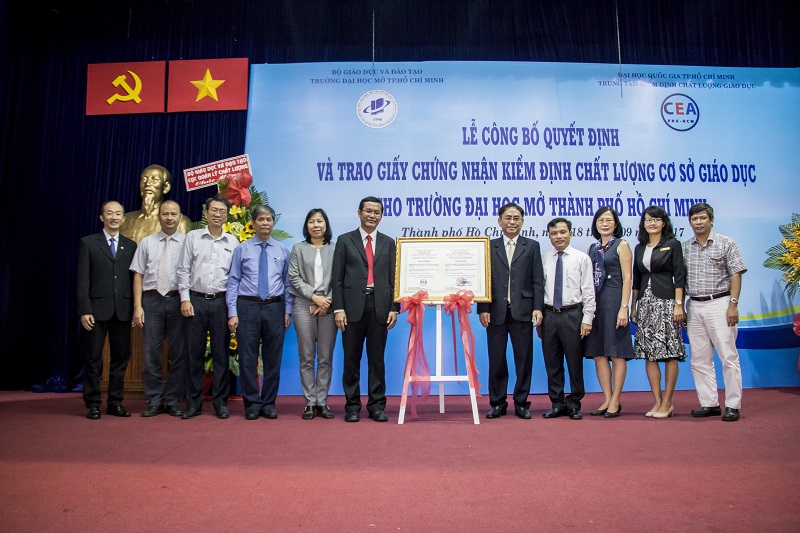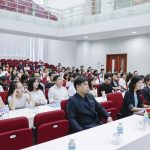The reception of Certificate of Quality Education
On the morning of September 18, 2017, Ho Chi Minh City Open University received the Certification Decision on education quality standards issued by the Minister of Education and Training.

The meeting was attended by Assoc. Prof. Dr. Mai Van Trinh – Director General of Education Quality Assurance Department, Mr. Pham Thien Kha – Deputy Party Committee Secretary of Universities and Colleges in Ho Chi Minh City, Mr. La Hoai Tuan – Chief of Staff of Quality Assurance Center, Assoc. Prof. Dr. Doan Thanh Ha – Vice-Rector of the University of Banking, Dr. Tran Khanh Lam – Secretary General of Vietnam Association of Certified Public Accountants, representatives of the school’s union, Standing Committee of the school’s youth union, the Secretariat of the Student Association, representatives of the school’s officials, students, National Education Union of Vietnam, Party committee of Universities and Colleges, Education Quality Assurance Department, Ho Chi Minh City University of Law, Sai Gon University, Ho Chi Minh City University of Agriculture and Forestry, University of Marketing & Finance, etc.

At the meeting, Assoc. Prof. Dr. Nguyen Van Phuc – Party Secretary – Rector of Ho Chi Minh City Open University, reviewed the process of implementing the external evaluation and some significant milestones of the university. Ho Chi Minh City Open University had completed reports on self-evaluation concerning educational quality for the first time in 2009. In 2005, HCMC Open University had completed its report on self-evaluation concerning educational quality for the second time in 2015. In 2016, HCMC Open University updated its self-report and registered for external evaluation. In 2017, after having completed its self-evaluation, Ho Chi Minh City Open University registered at VNU-HCM Center for Education Accreditation so that the university’s educational quality could be evaluated. On September 5th – 6th the delegation of the external assessment was welcomed by Ho Chi Minh City Open University for preliminary evaluation. From May 16th – 20th, 2017, a commission of external evaluation came to evaluate the school’s educational quality (the official external evaluation).

Evaluating the achieved result of Ho Chi Minh Open University, Assoc. Prof. Dr. Nguyen Hoi Nghia, Director of VNU-HCM Center for Education Accreditation, stated that the university’s mission links closely to the duties as well as the social trend in education. He also highly appreciated the university’s preparation for the external evaluation. Moreover, the fact that the university had promptly organized training for the inspection work following the new standard set that suits the requirements of AUN QA was considered as a positive improvement. Besides, Mr. Nghia also emphasized that Ho Chi Minh City Open University should continue promoting the achievements in education and training to contribute to the development of the university and education in general.
Speaking at the meeting, Assoc. Prof. Dr. Nguyen Van Phuc also stated that Ho Chi Minh City Open University would quickly act on incomplete things and certainly have changes to facilitate sustainable development.
In August 2017, after doing the external evaluation at Ho Chi Minh City Open University, VNU-HCM center for Education Accreditation organized a council for the evaluation of results relating to quality of Ho Chi Minh City Open University of the external delegation and proposed the university’s educational quality for being recognized.
The evaluation results reported by the external evaluation delegation: 52/61 criteria (85.25%).

- On June 15th, 1990, the Minister of Education and Training issued Decision No.451/TCCB on the establishment of The Institute of Open Training which belonged to the School of University’s Administrators – Secondary Vocational Schools. It was the first name of the university. This was the first university in Vietnam following the open pattern. The establishment of Ho Chi Minh Open University is to implement the policy of socializing education and create opportunities for everyone to study with different levels from the bachelor’s degree program to doctorate. The training forms vary from full-time education program to continuing education, which brings flexibility and convenience to the learners.
- On July 26, 1993, the Prime Minister issued Decision No. 389-TTg to establish the Ho Chi Minh City Semi-Public Open University;
- On June 22, 2006, the Prime Minister issued Decision No. 146/2006 / QD-TTg on changing the type of Semi-public universities and colleges, and the university was named Ho Chi Minh City Open University until today;
- On June 12, 2015, the Prime Minister issued Decision No. 850 / QD-TTg approving the pilot scheme of renovating the operational mechanism of Ho Chi Minh City Open University during the period of 2015-2017.
Right from the first day of establishment, the university has determined its mission to be “a university training institution with various types of distance education, on-site training, satellite training, etc. to meet diverse learning needs of society, strengthening the contingent of scientific and technical cadres for the country”. Currently, the university has different training levels: Ph.D., Master, and Undergraduate. The university has 21 majors in the form of full-time and part-time education. There are 3 majors at the doctorate level while the master level consists of 8 majors.
At present, there are over 1,000 students at the graduate level; over 11,000 full-time students and over 20.0000 part-time students. With the vision towards 2030, Ho Chi Minh City Open University would become a leading public university with multi-majors in Vietnam with the practical orientation, and its distance learning would develop as the same pace as that of Southeast Asia.



Development Strategies of period 2013-2023 had 8 objectives:
[1] Having a high-quality training system aimed at serving the learning demands of society, which includes a reasonable training structure; modern, practical and highly interconnected training program; learner-centered teaching methods; sufficient learning materials; evaluation system to promote training quality; and effective quality assurance system.
[2] Doing effective scientific research to serve training and the community
[3] Having practical student service, including exciting and beneficial students’ activities; and broad alumni network;
[4] Linking closely to the community through cooperative activities with local people, enterprises, and other organizations, international co-operations, and businesses for social benefits.
[5] Having capable and qualified human resources, including lecturers and experts who can meet the school’s aim of development.
[6] Having convenient and sufficient facilities, which includes learning space, and facilities for standard teaching and research; modern IT infrastructure and useful library system;
[7] Setting up professional management processes; building an effective, creative and friendly work environment.
[8] Ensuring financial balance and development, meeting the development requirements of the university and improving the lives of teachers, officials and employees.





